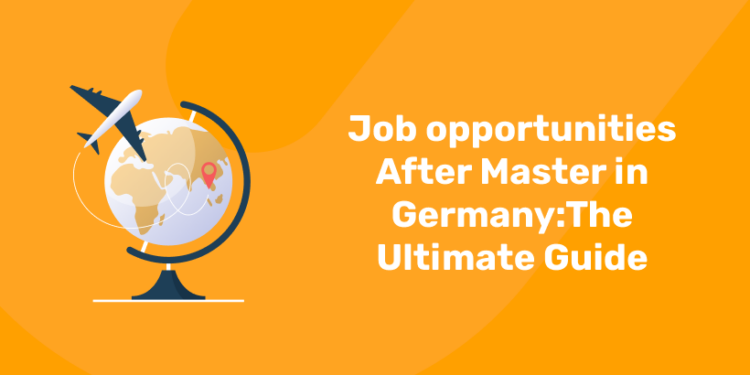Table of Contents
Are you planning to pursue a Master’s in Germany? Excellent decision! After finishing your studies, there are numerous job opportunities available here. This article is about Job opportunities After Master in Germany:The Ultimate Guide.
You will learn about the industries seeking professionals like you, understand the importance of work permits, and learn why language proficiency can be helpful. Get valuable tips on finding employment and navigating the German job market.
Ready to take your German language skills to the next level? Get Free Demo Classes Here!
Introduction of MS in Germany
Master of Science (MS) programs in Germany are advanced, specialized courses of study that allow students to deepen their knowledge in specific fields. Given below are some information about MS programs in Germany:
Specialization:
- MS programs focuses on specialization of subjects, offering an in-depth understanding of a particular field of study.
Duration:
- The duration of MS programs in Germany is 2 years.
- Some programs may vary in length.
Language of Instruction:
- Most of the courses are in English, making them suitable for international students.
- Proficiency in the German language can be an advantage.
Research Opportunities:
- German universities are known for the importance that they give on research.
- MS students often engage in research projects, contributing to advancements in their respective fields.
Practical Orientation:
- Programs often include practical components such as internships, lab work, or industry collaborations, enhancing hands-on skills.
International Environment:
- Germany attracts individuals from around the world, resulting in a diverse and multicultural learning environment.
Affordable Education:
- Germany offers affordable or even tuition-free education, making it an attractive destination to study MS.
Industry Connections:
- Universities often have strong ties with industries, providing students with networking opportunities.
Global Recognition:
- Degrees from Germany are globally recognized for their quality.
- This contributes to the international employability of graduates.
Application Process:
- Applying for an MS program involves submitting:
- academic transcripts,
- letters of recommendation,
- a statement of purpose, and,
- in some cases, standardized test scores like the GRE.
Visa Requirements:
- International students need to have a student visa to study in Germany.
- This process includes proof of acceptance into a university, financial stability, and health insurance.
Career Opportunities:
- Completing an MS program opens up various career opportunities.
- Germany’s strong economy provides job opportunities in industries related to a student’s field of study.
Top Recruiters for Jobs after MS in Germany
1: How do you say "Good Morning" in German?
In Germany, there are several opportunities for employment after completing a Master’s program. Some top recruiters and industries that frequently hire professionals with an MS degree are:
Automotive Industry:
Companies: Volkswagen, BMW, Daimler, and Bosch.
Job: provide opportunities for engineers and specialists in automotive technology.
Engineering and Manufacturing:
Companies: Siemens, ThyssenKrupp, and BASF
Job: provide roles in mechanical, electrical, and chemical engineering.
Information Technology:
Companies: SAP, Deutsche Telekom, and Siemens AG
Job: offer positions for IT professionals, software engineers, and data analysts.
Consulting Firms:
Companies: McKinsey, Boston Consulting Group (BCG), and Ernst & Young (EY)
Job: recruit professionals with analytical and strategic skills.
Finance and Banking:
Companies: Deutsche Bank, Commerzbank, and Allianz
Job: hire graduates with finance and business-related degrees.
Healthcare:
Companies: Bayer, Boehringer Ingelheim, and Merck
Job: provide opportunities in research, development, and healthcare management.
Energy Sector:
Companies: E.ON, RWE, and Siemens Energy
Job: offer positions for professionals in renewable energy, power engineering, and environmental sciences.
Aerospace and Aviation:
Companies: Airbus, Lufthansa, and MTU Aero Engines
Job: offer roles in aviation engineering and management.
Consumer Goods:
Companies: Nestlé, Procter & Gamble, and Henkel
Job: provide opportunities in marketing, supply chain, and product development.
Research and Academia:
Companies: German universities and research institutions
Job: offers positions for researchers and academics in various disciplines.
Pharmaceuticals and Biotechnology:
Companies: BioNTech, Bayer, and Merck KGaA
Job: offers roles in research and development.
Telecommunications:
Companies: Deutsche Telekom and Vodafone
Job: opportunities in network engineering, software development, and telecommunications management.
Free German A1 Mock Tests – Powered by AI!
Test your skills on our interactive platform. Get instant feedback from our AI to help you communicate better and track your progress. Start your free German mock test now.
Test Your German A1 for FreeHighest Paying Provinces in Germany
Certain regions in Germany are known for their economic strength and higher average salaries.
Hesse (Hessen):
- Frankfurt, located in Hesse, is a major financial hub, hosting the European Central Bank.
- The region’s economic strength contributes to higher average salaries.
Baden-Württemberg:
- This region is known for its strong industrial base, including the automotive and manufacturing sectors.
- Cities like Stuttgart and Karlsruhe contribute to a higher standard of living.
Bavaria (Bayern):
- Munich is the capital of Bavaria.
- It is a thriving economic center with a strong focus on technology, finance, and manufacturing.
- It is one of the wealthiest regions in Germany.
North Rhine-Westphalia (Nordrhein-Westfalen):
- Cities like Düsseldorf and Cologne in the above said region are significant economic centers, particularly in finance, logistics, and trade.
Lower Saxony (Niedersachsen):
- It benefits from industries like automotive, energy, and technology.
Top specializations for MS jobs in Germany
Here are some specializations that have traditionally been sought after:
- Engineering (Mechanical, Electrical): Strong demand in manufacturing and technology.
- Computer Science and IT: High demand for IT, software, and data experts.
- Automotive Engineering: Opportunities abound in Germany’s prominent automotive sector.
- Renewable Energy, Environment: Growing demand for sustainability professionals.
- Finance, Business Analytics: Financial hubs seek skilled finance and analytics professionals.
- Medicine, Healthcare: Opportunities in Germany’s advanced healthcare system.
- Aerospace Engineering: Aerospace industry offers roles in aviation and space.
- Biotechnology, Life Sciences: Research and development opportunities in innovation.
- Telecommunications: Digitalization fuels demand for telecom and network experts.
- Robotics, Automation: Industry 4.0 focus creates demand for automation specialists.
Jobs after MS in Germany: Highest Paying Universities
- Technical University of Munich (TUM):Strong engineering and technology focus.
- Ludwig Maximilian University of Munich (LMU Munich):Renowned for research and innovation.
- University of Mannheim: Excellent business and economics programs.
- RWTH Aachen University: Engineering and technology expertise.
- University of Stuttgart: Strong emphasis on engineering and manufacturing.
- Goethe University Frankfurt: Leading in finance, economics, and business.
- University of Bonn: Notable for agriculture, economics, and social sciences.
- University of Freiburg: Renowned for natural sciences and humanities.
- Humboldt University of Berlin: Leading in social sciences and humanities.
- University of Hamburg: Strong focus on research and interdisciplinary studies.
Free German A1 Mock Tests – Powered by AI!
Test your skills on our interactive platform. Get instant feedback from our AI to help you communicate better and track your progress. Start your free German mock test now.
Test Your German A1 for FreeTop Paying Companies after MS in Germany
Let us look at the top paying recruiters for Masters in Germany.
| Company | Salaries (year) |
| BMW | 83,000 euro |
| Bain & Co | 132,000 euro |
| PwC | 79,000 euro |
| Bosch | 70,000 euro |
| Delivery Hero | 58,000 euro |
| Volkswagen | 55,000 euro |
| Allianz | 75,000 euro |
| Deloitte | 75,000 euro |
| Zalando SE | 64,000 euro |
How to Apply for Jobs after Completing MS in Germany?
Applying for jobs after completing your master’s in Germany can be approached in various ways:
Networking:
- Attend professional events, conferences, and meetups.
- Connect with professionals on platforms like LinkedIn.
- Join industry-related groups and forums.
- Engage in conversations to build meaningful relationships.
- Networking can lead to job referrals and insider insights.
Job Portals:
- Create profiles on popular job portals like Indeed, StepStone, and LinkedIn.
- Upload your resume mentioning your skills and qualifications.
- Browse through the websites for job listings and apply for the positions that suit you.
- Regularly check for new job postings and updates.
- These portals provide a convenient and widespread platform for job seekers.
Official Websites:
- Identify companies you’re interested in working for.
- Visit the official websites of these companies.
- Look for dedicated career or job sections on their websites.
- Check for job openings, internship opportunities, or graduate programs.
- Applying through a company’s official website shows initiative and specific interest.
Walk-in Interviews:
- look out for companies that conduct walk-in interviews.
- Attend job fairs and recruitment events happening in your area.
- Prepare a concise pitch showcasing your skills and experience.
- Attend these events with copies of your resume and other relevant documents.
- They provide a chance for immediate interaction with recruiters.
Conclusion:
The probability of finding a job after completing Master’s degree in Germany is very high. They offer very good job profile and salaries in different provinces of the country. Since most of the programs are offered in English, Indians find it easy to continue their studies there. But knowing German would be an added advantage for the individuals seeking jobs in Germany.
Ready to take your German language skills to the next level? Get Free Demo Classes Here!
Job opportunities After Master in Germany : FAQs
1. What are the changes of getting a good job in Germany after completing a master’s degree?
- Germany offers excellent job opportunities for individuals with master’s degrees.
2. Does one need to know the German language to secure a job after their master’s?
- While knowing German can be an advantage, many international companies and research institutions use English as their official language.
3. How can networking help one in finding job opportunities?
- Networking is crucial in Germany. One can attend industry events, connect with professionals on LinkedIn, and participate in meetups to enhance their job prospects.
4. Which job portals are popular for job searches in Germany?
- Popular job portals in Germany include Indeed, StepStone, Arbeitsagentur, and LinkedIn. These platforms list a wide range of job opportunities.
5. Is it advisable to apply through official company websites?
- Yes, checking and applying through official company websites is a good practice.
6. Are walk-in interviews common for job searches in Germany?
- Yes, especially in job fairs and recruitment events. Walk-in interviews provide direct interaction with recruiters and a chance to make a strong impression.
7. Do German companies prefer individuals with practical experience?
- Yes, practical experience is highly valued. Consider internships, part-time jobs, or cooperative education programs during your master’s studies.
8. Is it essential for one to have a job offer before completing their master’s program?
- While not compulsory, having a job offer before graduation can be an advantage.
9. Which are the highest-paying provinces in Germany?
- Provinces such as Bavaria, Hesse, and Baden-Württemberg offer higher job opportunities and good salaries.
10. Can one find job opportunities in Germany in fields other than STEM?
- Yes, Germany has opportunities in various sectors. However, proficiency in the German language might be more crucial in non-STEM fields.
| German Language Courses | |
| German Language A1 Course Online Coaching | German Language A2 Course |
| German Language B1 Course online Coaching | German Language B2 Course Online Coaching |












